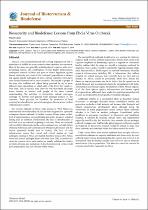JavaScript is disabled for your browser. Some features of this site may not work without it.
- ResearchSpace
- →
- Research Publications/Outputs
- →
- Journal Articles
- →
- View Item
| dc.contributor.author |
Lebea, Phiyani J

|
|
| dc.date.accessioned | 2015-03-12T09:36:11Z | |
| dc.date.available | 2015-03-12T09:36:11Z | |
| dc.date.issued | 2014 | |
| dc.identifier.citation | Lebea, P.J. 2014. Biosecurity and Biodefense: Lessons from Ebola Virus Outbreak. Journal of Bioterrorism & Biodefense. Vol. 5(1), pp. 2157-2526 | en_US |
| dc.identifier.issn | 2157-2526 | |
| dc.identifier.uri | http://hdl.handle.net/10204/7894 | |
| dc.description | Copyright: 2014. Omics Publishing Group. This is an open-access article. Published in Journal of Bioterrorism & Biodefense, vol.2014, pp 2157-2526 | en_US |
| dc.description.abstract | The current Ebola outbreak should serve as a warning for Africa to organize itself in terms of three major points. Firstly, there needs to be a greater emphasis on developing a policy at regional or continental level to outline what the steps are, should a contagious outbreak be suspected. Such a policy would be adopted by regional member states since diseases such as Ebola respect no national boundaries. Secondly, research infrastructure including BSL 4 laboratories that address research on animal diseases, that currently have no cure and are endemic in Africa, should be prioritized. Ebola virus disease has shown us that an epicenter may be in Africa, but the spread can be global. Research and development should be strengthened with better collaboration and human capital development within African regions. If all the three spheres (policy, infrastructure and human capital development) are addressed, there would be a quick turnaround period in assay development to detect specific prioritized pathogens. | en_US |
| dc.language.iso | en | en_US |
| dc.publisher | Omics Publishing Group | en_US |
| dc.relation.ispartofseries | Workflow;13707 | |
| dc.subject | Ebola virus | en_US |
| dc.subject | Contagious diseases | en_US |
| dc.subject | Animal diseases | en_US |
| dc.subject | Human capital development | en_US |
| dc.title | Biosecurity and Biodefense: Lessons from Ebola Virus Outbreak | en_US |
| dc.type | Article | en_US |
| dc.identifier.apacitation | Lebea, P. J. (2014). Biosecurity and Biodefense: Lessons from Ebola Virus Outbreak. http://hdl.handle.net/10204/7894 | en_ZA |
| dc.identifier.chicagocitation | Lebea, Phiyani J "Biosecurity and Biodefense: Lessons from Ebola Virus Outbreak." (2014) http://hdl.handle.net/10204/7894 | en_ZA |
| dc.identifier.vancouvercitation | Lebea PJ. Biosecurity and Biodefense: Lessons from Ebola Virus Outbreak. 2014; http://hdl.handle.net/10204/7894. | en_ZA |
| dc.identifier.ris | TY - Article AU - Lebea, Phiyani J AB - The current Ebola outbreak should serve as a warning for Africa to organize itself in terms of three major points. Firstly, there needs to be a greater emphasis on developing a policy at regional or continental level to outline what the steps are, should a contagious outbreak be suspected. Such a policy would be adopted by regional member states since diseases such as Ebola respect no national boundaries. Secondly, research infrastructure including BSL 4 laboratories that address research on animal diseases, that currently have no cure and are endemic in Africa, should be prioritized. Ebola virus disease has shown us that an epicenter may be in Africa, but the spread can be global. Research and development should be strengthened with better collaboration and human capital development within African regions. If all the three spheres (policy, infrastructure and human capital development) are addressed, there would be a quick turnaround period in assay development to detect specific prioritized pathogens. DA - 2014 DB - ResearchSpace DP - CSIR KW - Ebola virus KW - Contagious diseases KW - Animal diseases KW - Human capital development LK - https://researchspace.csir.co.za PY - 2014 SM - 2157-2526 T1 - Biosecurity and Biodefense: Lessons from Ebola Virus Outbreak TI - Biosecurity and Biodefense: Lessons from Ebola Virus Outbreak UR - http://hdl.handle.net/10204/7894 ER - | en_ZA |






